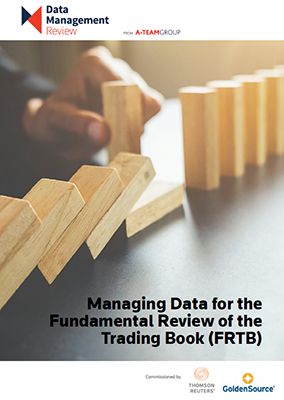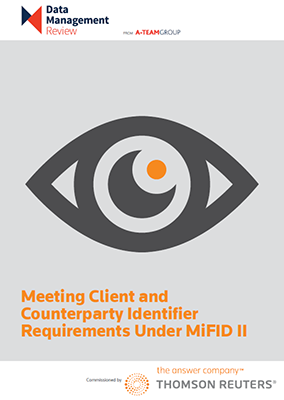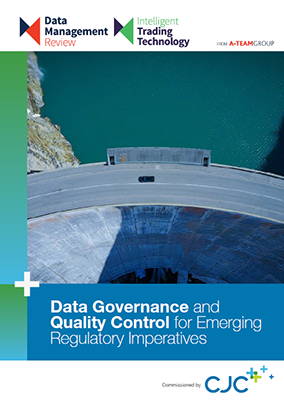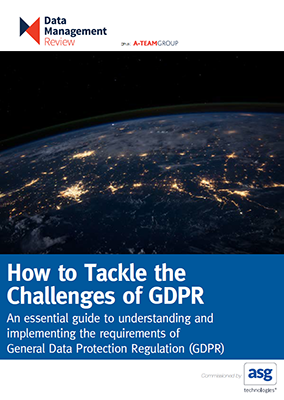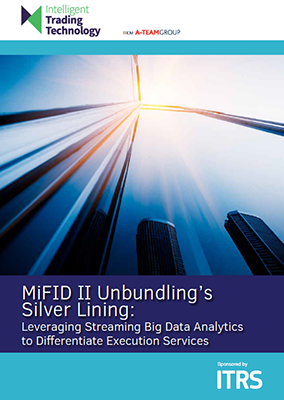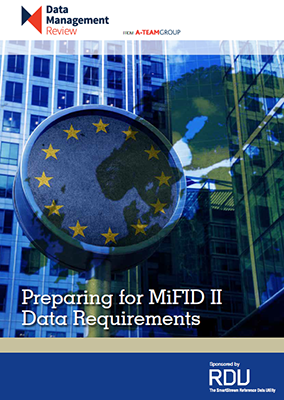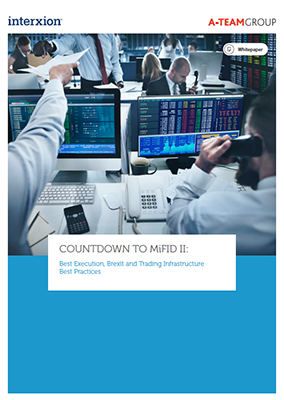RegTech Insight Regulations The latest content from across the platform
MiFID II: Industrialising the Response Using UL BRIDGE
Many firms within the scope of Markets in Financial Instruments Directive II (MiFID II) struggled to meet the regulation’s deadline of January 3, 2018 and are now waking up to the fact that many of the processes put in place for implementation day are not sustainable. To achieve and maintain MiFID II compliance over time…
Managing data for the Fundamental Review of the Trading Book (FRTB)
FRTB presents banks with a number of organisational, computational and data granularity challenges. These require firms to review the structure of their trading desks, adopt revised risk models, and source extensive data including 10-plus years of time-series data. This white paper, sponsored by Thomson Reuters and GoldenSource, details the regulation’s demand for additional data, examines…
Meeting Client and Counterparty Identity Requirements Under MiFID II
The January 3, 2018 compliance deadline for Markets in Financial Instruments Directive II (MiFID II) is approaching fast, requiring firms within its scope to ensure they have access to LEIs to identify all clients, counterparties and issuers they deal with. As the industry mantra goes, and in line with MiFID II and its related Markets…
Data Governance and Quality Control for Emerging Regulatory Imperatives
Impending regulations, following recent price manipulation investigations, will require trading firms to have new data governance and quality controls in place. A new benchmarking study by CJC, in association with A-Team Group, conducted amongst professionals within major Tier 1 and Tier 2 sell side institutions, explores the data governance demands posed by new and emerging…
MiFID II: Setting a Mobile Policy for Compliance and Trading Business
Markets in Financial Instruments Directive II (MiFID II) requires firms to record all trading-related electronic and voice communication. This includes recording communications made using mobile devices, whether they are firm or employee owned. The directive also extends previous requirements to record and store communications that resulted in a trade, to record and store communications that…
MiFID II: Time for Action
As the January 3, 2018 compliance deadline for Markets in Financial Instruments Directive II (MiFID II) approaches, trading businesses within the scope of the regulation must address outstanding technology issues around elements such as transparency, best execution, algorithmic trading, high frequency trading, time synchronisation and systematic internalisation. This White Paper, sponsored by Itiviti, discusses MiFID…
How to Tackle the Challenges of GDPR
Financial institutions around the world are bracing themselves for the onset of the EU’s General Data Protection Regulation (GDPR), which introduces eye-watering financial penalties for firms failing to meet stringent new rules on managing the personal data of EU residents. GDPR – which comes into effect in May 2018 – will have a major impact…
MiFID II Unbundling’s Silver Lining: Leveraging Streaming Big Data Analytics to Differentiate Execution Services
European MiFID II regulation’s unbundling of broker research from execution services raises the question of how execution service providers can differentiate what they offer once research is no longer part of their relationship with buy-side clients. Best-execution provisions and the performance of brokers’ platforms could become the primary differentiator. This raises a follow-up question –…
Preparing for MiFID II Data Requirements
Markets in Financial Instruments Directive II (MiFID II) is a wide-ranging regulation that aims to add transparency to Europe’s financial services sector in order to ensure investor protection and integrity of markets. The regulation extends the scope of MiFID, which focused on equities, to cover pre-trade, trade and post-trade activities across many asset classes. This…
Countdown To MiFID II: Best Execution, Brexit and Trading Infrastructure Best Practices
The events of 2016 have muddied the waters for financial institutions operating in Europe that need to figure out how planning for possible outcomes of Brexit will in turn affect compliance with European MiFID II regulation taking effect in January 2018. While it is widely recognised that firms will have to make major changes to…



